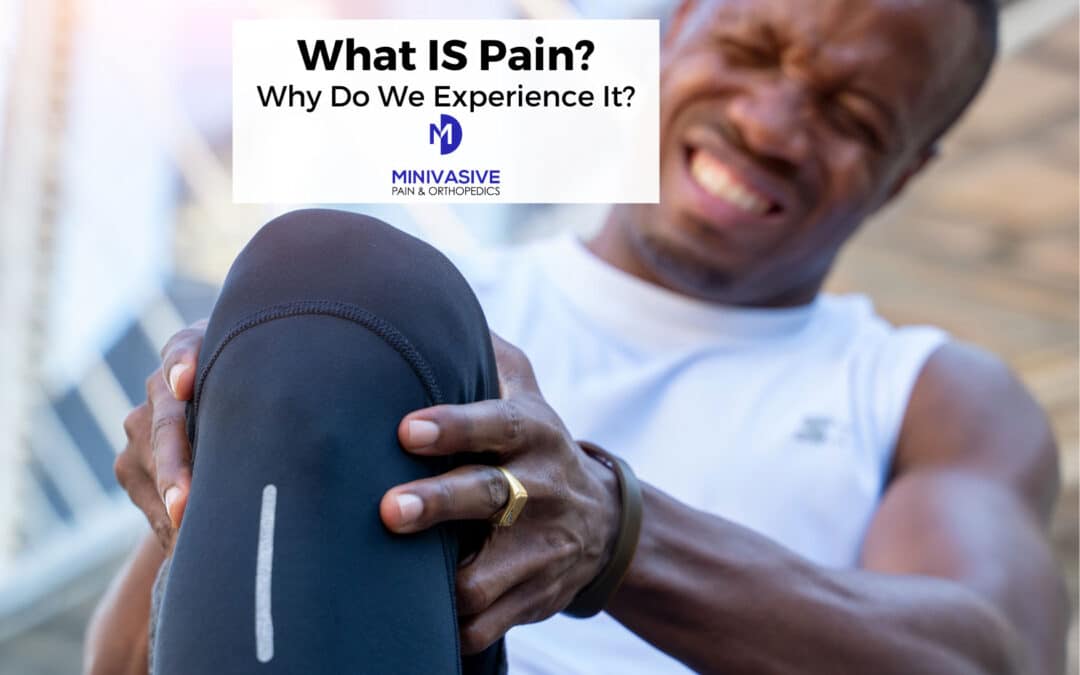Often invisible to the eyes of others, chronic pain can take a toll on someone’s mental and physical wellbeing. Living with intense pain can be detrimental to social relationships, inhibit one from working, and doing the things they once enjoyed. It can become debilitating, embarrassing and life-altering.
We have all experienced pain and can imagine what it feels like, but what is pain, exactly? The Minivasive orthopedic specialists detail everything you need to know below.
Pain: Defined
Pain is defined by the International Association for the Study of Pain (IASP) as: “An unpleasant sensory and emotional experience associated with, or resembling that associated with, actual or potential tissue damage.”
While everyone has a basic understanding of what pain is, it feels different to each individual. A variety of social, genetic, and psychological factors, for example, memory of previous injuries or long-term health problems, affect how a patient experiences and manages their pain. These factors can vary from situation to situation, even within the same person.
Designed by evolution as a way to protect ourselves, pain is our body’s first defense against injury. When we feel pain from a stubbed toe or sprained ankle, that part of your body sends signals to the nervous system that something has gone wrong and that the body is in danger. These signals to the brain are what cause us to react and prevent further harm.
The Difference Between Acute and Chronic Pain
Experiencing pain is an inevitable part of life. We’ve all stubbed a toe, sprained an ankle, or slept in an awkward position and woke up feeling sore the next morning. This pain, the small injuries that subside after a few hours or days, is called acute pain.
On the other hand, chronic pain, sometimes called persistent pain is defined as lasting for three months or more, or past normal tissue healing time. This occurs when your body’s nervous system becomes overprotective of a previous injury. Chronic pain is a miscommunication between your body and mind. Your tissues may no longer be at risk, but your mind still receives signals that they are, producing feelings of pain that can last for months at a time with no relief. Like any nervous system function, this reaction is something your body learns over time based on both psychological and social factors.
Persistent pain often serves no useful purpose. Over time, it can affect what patients can and cannot do, their ability to go to work, as well as their ability to get adequate amounts of sleep. It can have a strong negative effect on a patient’s relationships with family and friends, too, as they’re often left wondering what happened to their loved one or why they can no longer do the things they used to.
Fortunately, with time and medical guidance, your nervous system can be “taught” to become less protective. Common strategies to achieve this are activity-based, psychological skills, and self-management strategies. These strategies include learning about pain, gradually increasing your activity and movement through physical therapy, as well as working on your thoughts, emotions, and coping skills.
Living with Chronic Pain: Minivasive Pain & Orthopedics
At Minivasive, our mission is to get you back to the joys of your life by treating the underlying causes of your chronic pain. Our experienced team of pain specialists will create an individualized treatment plan that works for you. If you’re tired of chronic pain getting in the way of the things you enjoy, reach out to us today for help or get started with our online pain assessment. With several locations throughout the Greater Houston Area, getting your life back on track is just a phone call away. To schedule an appointment, call us today at (346) 800-6001.
References:
- American Chronic Pain Association: https://www.theacpa.org/
- American Pain Society: https://americanpainsociety.org/
- National Institute of Neurological Disorders and Stroke: https://www.ninds.nih.gov/Disorders/All-Disorders/Pain-Information-Page
- Pain News Network: https://www.painnewsnetwork.org/
- WebMD Pain Management: https://www.webmd.com/pain-management/
Want to keep up with us? Follow our social media!

